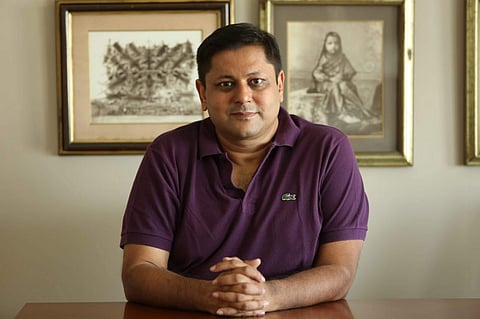

At a time when godmen are revered more than industrious professionals, dedicated doctors and unappreciated volunteers, it makes perfect sense to chalk up a publication that revolves around their, umm, mysterious existence. Author Manoj Jain has spent considerable time researching components of this undertaking — listening to talks given by spiritual leaders, meeting devotees, understanding their religious regime, following their patterns and more. We talk to him about his latest novel, A Man From Mandu, and here are the excerpts:
Tell us a bit about yourself, especially your educational background and personal interests.
I completed my MBA from IIM Ahmedabad and then started a business in garment export. Years later, in my forties, I did my Masters in Psychology. I enjoy meeting people, reading, solving puzzles, travelling and (am ashamed to admit) smoking!
What triggered your interests in writing? Was there any specific incident or experience?
As a child, I was a quiet boy who used to read a lot and was always fond of writing. I began writing poems and long stories at the age of eight and had always dreamt of being an author. During my college years, I would contribute to magazines regularly. By my late twenties, I was too involved with work and the dream of writing faded away. My kids were born during my thirties and those years comprised chiefly of family time. By my mid-forties, I wanted to write but the style of writing and the books themselves had evolved a lot during the past decade and I wondered if I could actually write the way young authors did. My nephew suggested I keep a blog and as I began writing for it - this developed into my first novel.
How many books have you written so far? Which one was the most successful/best received, and how did it positively affect your career?
I have written six books till now. So far, Balraj has been the best received although my latest book A Man from Mandu is just a couple of weeks old and is doing very well- eventually I think that will be my best received book.
In a country obsessed with Engineering and Medicine, how viable is it for someone to become an author? Is it better to have a main day job, and write part-time?
As a full-time profession, I do not think that it is very viable for a person to become an author — at least to start with. But writing part-time or after one has built some savings is definitely possible.
Tell us a little about your book, A Man from Mandu. What inspired you to write it and what are its salient features?
A Man From Mandu has two parallel stories going on: one is the story of Tarini who, prompted by a bet, is trying to take an ordinary conman and market him into a new-age godman. The other story is the growth of Dhawal and how he went from being just a man from Mandu to a spiritual seeker. Interspersed are various short stories.
How has your education in psychology and degree from IIM influenced your writing style?
Education always gives you a deeper understanding of topics. My studies at IIM taught me to keep my books logical, the stories credible and the studies in psychology helped me understand the characters and stay true to their personalities.
Who might your target audience be? What kind of message do you seek to convey to them, through your writing/books?
I target my books to the urban audience, usually adults. While most of the other books appeal more to people over the age of 25, A Man From Mandu cuts across age and gender and is universally appealing and gripping. I hope the readers get caught up in the story at the surface level but also ponder to think and identify themselves with question.
Was there any research or study that you needed to carry out before writing “A Man from Mandu”?
I did have to do a fair amount of research on Godman, conmen, their marketing techniques, names of existing Gurus (so I don’t mistakenly use one of their names). I also had to study behaviour patterns of devotees. I heard a lot of speeches of different Gurus too in the process of writing this book.
The topics covered in the book (Godmen, devotees, faith and money) are generally sensitive issues that have drawn a lot of controversy and criticism from a wide range of audiences (fake gurus, black money, religious discrimination, etc.). How viable is it to write and publish such a book, when most people prefer “light, fun or casual” reads these days?
Contrary to the book I released just before A Man From Mandu, this book is comparatively a light read. All my books are short (a necessity in these modern times or so I believe) and usually can be completed in one sitting or on a long flight. This book neither makes value judgments on Gurus nor on blind faith nor mocks the devotees. It highlights the situation and lays down how a Guru is created from a conman. One can take from the story what one wants to take.
What are your immediate plans, especially for the year ahead? Anything fun?
In personal terms, I hope to lose some weight and take care of my body, get fit! I plan to travel a lot Along the work front, the garment business is growing and I hope to continue the expansion plan which means a lot of energy and commitment and time.
What advice do you have for our young readers with respect to becoming authors, many of whom might become talented writers in the future?
I do not think I am wise enough or capable enough to give advice to anyone, at this time!
